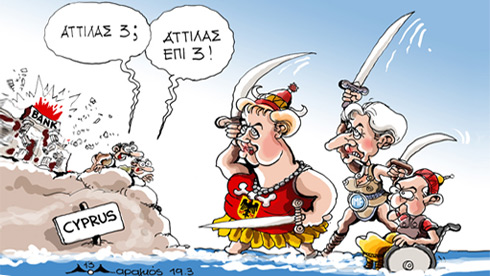In his bid to justify an unprecedented tax on bank deposits, German Finance Minister Wolfang Schäuble insists that the Cypriot economic model “has gone bankrupt.” In his fascist opinion, "anyone who invests money in a country where taxes are low and supervision is weak should suffer the consequences when the banks and the country itself cease to be viable."
We are convinced that the tax measures involved in the deal were discussed in front of Greek and Cypriot ministers. And what was their response? Did they point out that the Cypriot model was not devised by a rabble of swindlers but by a European state which had to find a means to survive in the aftermath of military invasion and occupation?
To avoid collapse, this state — half of which is still under military occupation, not that it would make any difference to Mr Schäuble — took the step of lowering taxes on tourism, marine charters and bank transactions to attract foreign investment.
The economy had to be given the means to develop in a context where Turkey — which controls 700,000 voters of Turkish origin in Germany — had strangled the Cypriot state by stealing 65 per cent of its hotels, 87 per cent of its holiday complexes, 40 per cent of its schools, 48 per cent of its agricultural exports and 56 percent of its beaches (and we will continue to reiterate these figures so that history will not be forgotten).
How was the Republic of Cyprus supposed to survive without an economic model designed to attract a level of investment that was sufficient to enable it to recover from the invasion [of 1974]? Is Mr Schäuble so focused on his economic lessons that he has no time for history?
Has no one thought to tell him that of the 80 foreign shipping companies registered in Limassol, 36 are German and only three are Russian? Or could it be that this is in fact the problem: the Germans have three Russian companies under their feet at a time natural gas is going to boost business and tankers will bustle to and fro throughout the Mediterranean?
Analysis
An opaque and undemocratic Eurogroup
Following the rejection by the Cypriot parliament of the tax on bank deposits, “nobody in Europe wants to take responsibility for the project to tax all bank deposits,” writes Il Sole 24 Ore, which believes “the confusion over this responsibility is due to the unbalanced decision-making mechanism that has marked these last years of the European crisis.” The problem, as usual, is that “the level at which the decision is made” – the European Council and the Eurogroup – “is never the place where the democratic choice lies” – with the national parliaments. What’s more,
Transparency in EU decision-making is very meagre: there are no minutes of the meetings of the Eurogroup, whose last chief to date was chosen also because of his lack of loquacity; the heads of government then agree bilaterally over the phone; and most importantly, there is no real public debate – but there are 17 debates within the 17 national boundaries.
According to the business daily, the internal confusion within the EU also complicates matters with the other player in this dossier: Russia, “which has between €20bn-25bn invested in Cyprus”.
Berlin wants first and foremost to shut down Cyprus’s financial channels with Moscow. That is a negotiation for the foreign ministers, not the finance ministers. Europe, however, has no common foreign policy, much less a common policy for the Eurozone. The result is that Cyprus will end up asking for help from Moscow. It may even depend on Russia to such an extent that it leaves the Eurozone. [...] Observers believe Cyprus has until June to decide whether it hitches its wagon to Moscow or goes bankrupt.
Was this article useful? If so we are delighted!
It is freely available because we believe that the right to free and independent information is essential for democracy. But this right is not guaranteed forever, and independence comes at a cost. We need your support in order to continue publishing independent, multilingual news for all Europeans.
Discover our subscription offers and their exclusive benefits and become a member of our community now!












